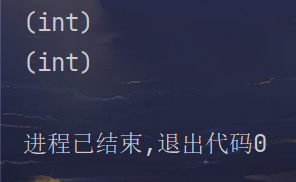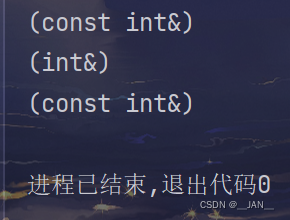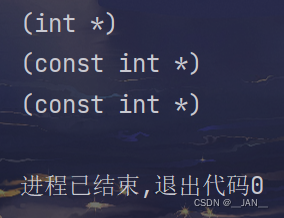C++函数匹配
__JAN__ 人气:0首先,编译器会确定候选函数然后确定可行函数可行函数,再从可行函数中进一步挑选
候选函数:重载函数集中的函数
可行函数:可以调用的函数
最后进行寻找最佳匹配
有以下几种规则
1.该函数的每个实参的匹配都不劣于其他可行函数
2.至少有一个实参的匹配优于其他可行函数的匹配
3.满足上面两种要求的函数有且只有一个
如果上面三个要求都没满足,则出现二义性
一些演示
各有一个精确匹配的实参,编译器报错,不满足条件3
error
void func(int a,int b)
{
cout << "(int,int)" << endl;
}
void func(double a, double b = 3.14)
{
cout <<"(double,double = 3.14)" << endl;
}
int main()
{
func(2.3,5);
}调用函数类型转换优先级,依次递减
1.精确匹配
包含三种
(1)实参形参类型匹配
(2)从数组或者函数转到对应的指针
(3)添加或者删除顶层const
2.通过const转换实现匹配
3.通过类型提升匹配
4.通过算术类型转换或者指针转换的匹配
5.通过类 类型转换实现的匹配
小整形一般提升为int或者long,即便他的面量很小
void func(int a)
{
cout << "(int)" << endl;
}
void func(short a)
{
cout << "(short)" << endl;
}
int main()
{
func(12);
func('a');
}运行结果

所有算数类型级别转换都一样
error
void func(double a)
{
cout << "(double)" << endl;
}
void func(float a)
{
cout << "(float)" << endl;
}
int main()
{
func(3.14);
}不能重载const 和非const两个版本,但是引用可以
关于引用:非const可以升级为const,但是const不能降级为非const
若有两种版本——const and not const,会根据传入的参数自动匹配
void func(const int &a)
{
cout << "(const int&)" << endl;
}
void func(int &a)
{
cout << "(int&)" << endl;
}
int main()
{
const int a = 3;
int b = 4;
func(a);
func(b);
func(5);
}运行结果

指针的情况于引用类似:
如果两个函数唯一的区别是他们指向的对象是常量或非常量,则编译器根据实参选择函数。
演示
void func(const int *a)
{
cout << "(const int *)" << endl;
}
void func(int *)
{
cout << "(int *)" << endl;
}
int main()
{
int a = 3;
int *pa = &a;
const int *c_pa = &a;
const int b = 4;
const int *pb = &b;
func(pa);
func(c_pa);
func(pb);
}运行结果

上面提到过的一些重载
using namespace std;
void func(int a)
{
cout << "(int)" << endl;
}
void func(double a)
{
cout << "(double)" << endl;
}
void func(int a,int b)
{
cout << "(int,int)" << endl;
}
void func(double a, double b = 3.14)
{
cout <<"(double,double = 3.14)" << endl;
}
void func(short a)
{
cout << "(short)" << endl;
}
void func(float a)
{
cout << "(float)" << endl;
}
void func(const int &a)
{
cout << "(const int&)" << endl;
}
void func(int &a)
{
cout << "(int&)" << endl;
}
void func(const int *a)
{
cout << "(const int *)" << endl;
}
void func(int *)
{
cout << "(int *)" << endl;
}加载全部内容